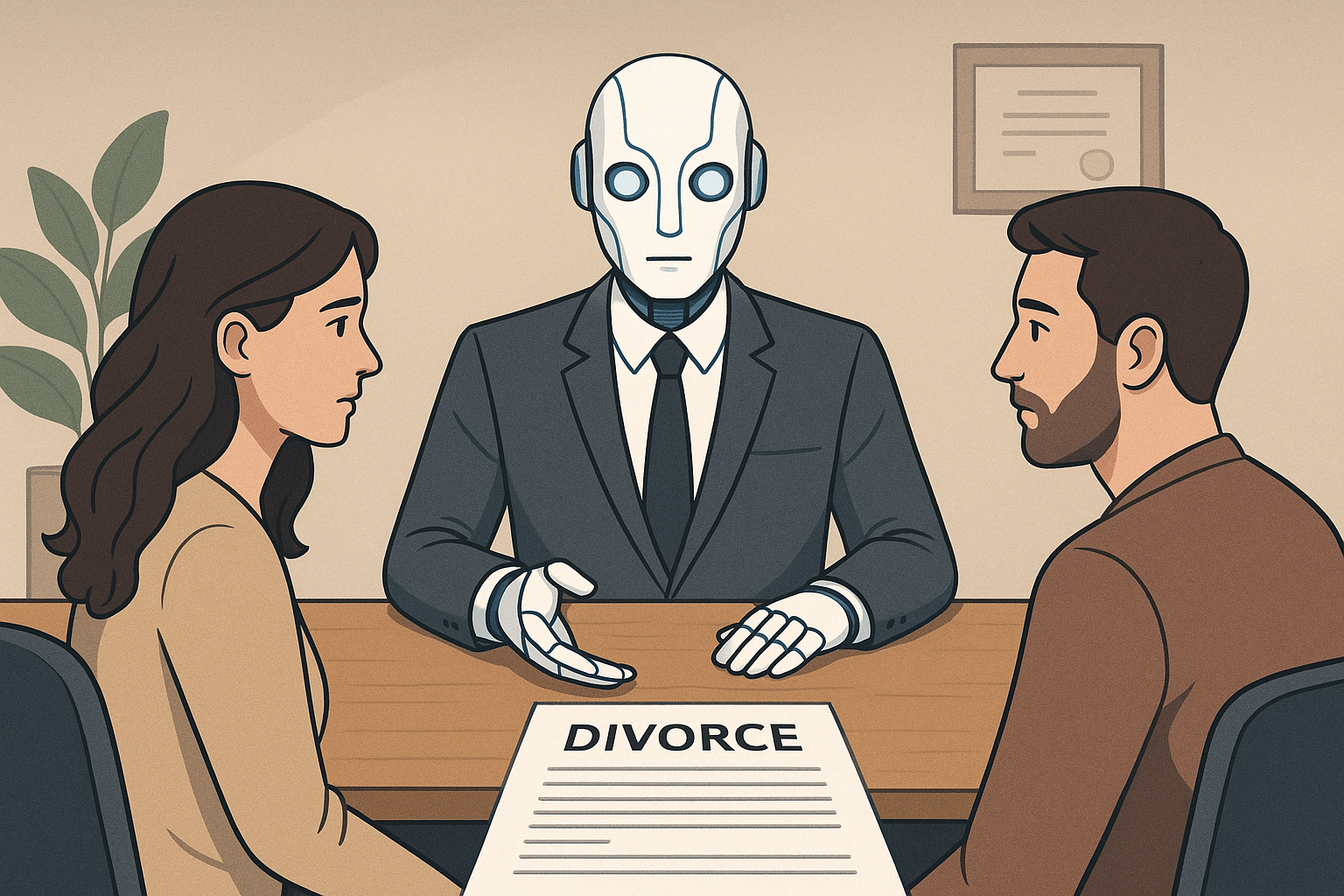Top Stories
Legal Expert Warns Against Relying on AI for Divorce Cases

The rise of artificial intelligence (AI) in the legal sector raises critical questions about its role in handling divorce cases. According to family law expert Ayesha Vardag, while AI can streamline some aspects of legal work, it is not equipped to manage the complexities involved in high-stakes divorces. Vardag, who has navigated some of the most intricate divorce cases in the United Kingdom and internationally, believes that trusting AI with such sensitive matters could pose significant risks.
Vardag recently collaborated with her husband, Stephen Bence, to assess a leading AI platform’s performance on a complex legal query. The findings were illuminating. While the AI understood general legal principles, it overlooked crucial nuances that can dramatically impact case outcomes. For instance, the AI failed to identify an alternative jurisdiction that could have altered the financial resolution for a client. Additionally, it did not consider the implications of a lengthy cohabitation period prior to marriage, a factor that can influence the application of English law regarding asset sharing.
These oversights are not trivial; they represent potentially costly mistakes that could affect financial futures. Vardag points out that while AI could automate more straightforward, lower-end legal tasks—such as those involving basic divorce paperwork—its effectiveness diminishes in contexts requiring strategic litigation and personalized legal advice.
Limitations of AI in Legal Nuance
The core issue lies in AI’s fundamental operation. AI systems are adept at summarizing existing knowledge and identifying patterns in data. However, they are not designed to innovate or adapt to novel legal circumstances. In the realm of English common law, which evolves through judicial interpretation, the ability to craft new legal arguments is essential. Vardag’s own landmark case, the Radmacher case, established the enforceability of pre-nuptial agreements in England, a significant shift from previous legal interpretations. AI, she argues, lacks the capacity to develop such transformative arguments.
Moreover, AI’s inability to gauge emotional dynamics or anticipate judicial responses adds another layer of complexity. It cannot determine when to pursue aggressive legal tactics or when to opt for settlement, thereby failing to provide the strategic insight necessary for success in family law.
Ethical Concerns and the Need for Regulation
Vardag expresses significant concern regarding the ethical implications of AI’s integration into legal practices. As AI tools begin to offer what appears to be regulated legal advice, the line between legitimate legal counsel and unregulated AI assistance becomes increasingly blurred. These platforms are not recognized as solicitors and lack the professional indemnity insurance required of qualified legal practitioners. Consequently, should an AI system fail and jeopardize a client’s case, the question of liability remains unresolved.
Who can clients hold accountable when a case collapses due to AI error? Is it the technology provider, the software developers, or the internet service provider? The Solicitors Regulation Authority must address these concerns to ensure accountability in legal representation.
Furthermore, the potential for confidentiality breaches is alarming. For example, if a client shares sensitive information with an AI tool, that data could be inadvertently exposed to opposing parties. Such scenarios not only breach ethical standards but also violate court rules, undermining the fundamental principle of confidentiality that underpins the legal profession.
AI is undoubtedly making its presence felt in the legal landscape, but Vardag asserts that it is not yet prepared to replace human lawyers. Presently, AI serves as a useful tool for basic legal tasks, but its application in complex situations remains precarious at best.
The legal profession must proceed with caution as AI continues to evolve. Calls for regulation, oversight, and clarity have never been more urgent. In matters of justice and personal stakes, relying on a system that may only achieve “good enough” outcomes is not a viable option.
-

 Entertainment2 months ago
Entertainment2 months agoAnn Ming Reflects on ITV’s ‘I Fought the Law’ Drama
-

 Entertainment3 months ago
Entertainment3 months agoKate Garraway Sells £2 Million Home Amid Financial Struggles
-

 Health2 months ago
Health2 months agoKatie Price Faces New Health Concerns After Cancer Symptoms Resurface
-

 Entertainment2 months ago
Entertainment2 months agoCoronation Street’s Carl Webster Faces Trouble with New Affairs
-

 Entertainment2 months ago
Entertainment2 months agoWhere is Tinder Swindler Simon Leviev? Latest Updates Revealed
-

 Entertainment3 months ago
Entertainment3 months agoKim Cattrall Posts Cryptic Message After HBO’s Sequel Cancellation
-

 Entertainment2 months ago
Entertainment2 months agoOlivia Attwood Opens Up About Fallout with Former Best Friend
-

 Entertainment2 months ago
Entertainment2 months agoMasterChef Faces Turmoil as Tom Kerridge Withdraws from Hosting Role
-

 Entertainment3 months ago
Entertainment3 months agoSpeculation Surrounds Home and Away as Cast Departures Mount
-

 Entertainment3 months ago
Entertainment3 months agoMarkiplier Addresses AI Controversy During Livestream Response
-

 World2 months ago
World2 months agoCole Palmer’s Mysterious Message to Kobbie Mainoo Sparks Speculation
-

 Entertainment2 months ago
Entertainment2 months agoITV’s I Fought the Law: Unraveling the True Story Behind the Drama





















